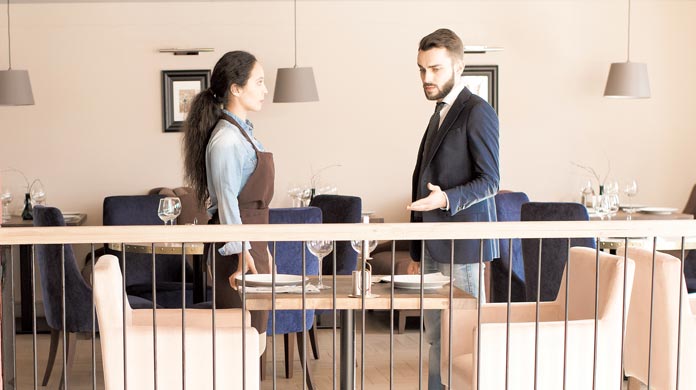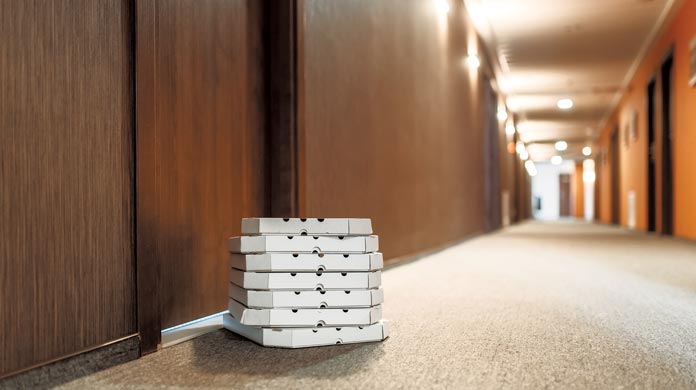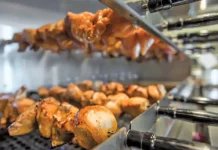
Much about the COVID-19 situation is fluid and evolving quickly.
Below, we have summarized the answers to the most common legal questions that restauranteur employers may have concerning compensation, working conditions, and accommodating employees who cannot work because of COVID-19-related reasons.
1. Non-essential businesses were ordered to close and in-service dining is prohibited in the city/state where my restaurant is located. Can my restaurant still operate?
Many states and localities, such as New York, have mandated that non-essential businesses close and/or have banned in-service dining at restaurants. Fortunately, restaurants offering delivery and take-out/carry-out services are generally considered to be an “essential business” and therefore, restaurants may continue to offer such services.
It is recommended that delivery persons engage in “no contact” delivery. Further, when offering carry-out services, restauranteurs should ensure that patrons entering the restaurant to pick up food maintain adequate physical distance, from both each other and restaurant staff – the recommendation is currently 6 feet. Contactless payment methods are encouraged where possible. Tables and chairs should be removed from the premises or otherwise made unusable to deter lingering at the restaurant. Further, it is vital that employers ensure their staff abide by CDC recommendations to prevent further contamination.
2. Do I have to pay my employees if I temporarily closed my restaurant because of the COVID-19 pandemic?
Whether an employer is required to pay an employee depends on whether the employee is classified as an exempt or non-exempt hourly employee. Employers do not have to pay non-exempt employees, such as most service employees and kitchen staff, who do not work.
However, employers are required to pay exempt employees, such as managers, head chefs and certain corporate office administrators, their full weekly salary if the exempt employee works any part of the workweek. If no work is performed during the entire week, employers are not obligated to pay the exempt employee their salary for that week.
Employers should be mindful that sending emails or making phone calls remotely constitutes work which must be compensated, whether the employee is exempt or non-exempt.
Depending upon the circumstances, employers in NY, IL and NJ may have to pay out statutorily mandated accrued, unused sick time.

3. Can my employee file for unemployment insurance if I temporarily closed my restaurant or laid them off?
Yes. Employees who suffer a loss of employment because of a shut down or reduction in staff due to the COVID-19 pandemic are likely eligible for unemployment insurance. Each state has different eligibility requirements.
New York employers should provide laid off and terminated employees with the NYDOL Record of Employment form at separation. That form is available at: https://www.labor.ny.gov/formsdocs/ui/employer-forms-publications.shtm.
New Jersey employers should provide laid off and terminated employees with Instructions For Claiming Unemployment Benefits. That document is available at: https://nj.gov/labor/handbook/formdocs/FormIntroBC10.html.
4. Do I have to pay my employees if I send them home because business is slow?
Yes. In New York, call-in pay is owed to non-exempt employees for reporting to work on a given day even if they are sent home early. The law makes no exceptions for situations like the current emergency.
Hospitality employers in New York must pay non-exempt employees for a minimum of at least 3 hours for one shift, OR the number of hours in their regularly scheduled shift (whichever is less). Payment for actual attendance should be paid at the employee’s regular or overtime rate minus the tip credit, if applicable, and payment for the balance of the call-in pay can be at the minimum wage. Employers are reminded that they may not take the tip credit if the tipped employee did not earn enough tips to bring their collective wages up to the minimum wage.
Outside of New York, call-in pay requirements vary by location.
5. If I was forced to close my restaurant or lay off a significant portion of my staff, do I have obligations under the WARN Act?
You might, depending on whether you are a covered employer under the federal WARN Act or a state’s counterpart.
The New York State WARN Act applies to employers with at least 50 employees and requires advance notice to affected employees if the restaurant is required to close down or suffers a mass layoff. Similarly, the federal WARN Act applies to employers with at least 100 employees and also requires advance notice to affected employees of a closure or mass layoff.
Generally, New York restaurants subject to WARN are required to provide affected employees with 90 days’ advance notice of a closing or mass layoff. However, in this crisis, because the closure or layoff is the result of “unforeseeable business circumstances,” the timing of the notice can be reduced from 90 days to whatever is reasonable. Both the federal WARN Act and the New York Act provide that “an unanticipated and dramatic major economic downturn or a government-ordered closing of an employment site that occurs without prior notice” qualifies as “unforeseeable business circumstances.” The notice to the employee must explain why the restaurant is giving reduced notice.
Many states, including, New Jersey, California and Illinois, also have mini-WARN Acts that require notice of closures and mass layoffs.
6. What should I do about my corporate staff? Can they work in my restaurant while we are offering limited take-out and delivery services?
New York, and a significant number of other jurisdictions, have mandated that only essential businesses remain open and that staff who can work remotely do so. Generally, corporate staff such as administrators helping with payroll, marketing and benefits, will not be considered necessary to be in the workplace, and restaurateurs should have those individuals work remotely.
When employees are working remotely, it is important to set reasonable expectations regarding working schedules, response time and prompt communication. Further, employers must ensure appropriate protections are implemented regarding confidentiality and data security. For non-exempt employees working remotely, it is also imperative that these employees are accurately recording all time spent working, including attending to emails and phone calls.
7. Can I discipline employees for refusing to come to work because they fear infection with COVID-19?
Generally, no. New York employers are prohibited from terminating or otherwise disciplining employees who fail to show up to work while the government is recommending or mandating that people stay inside to slow the spread of COVID-19. Other states may have similar laws placing restrictions on disciplining employees because they refuse to work out of fear of contracting COVID-19.
Further, under the Occupational Safety and Health Act, employers may not retaliate against employees who refuse to work where the employee has a reasonable belief of imminent danger. Whether any working environment rises to the level of imminent danger will depend on factors including, but not limited to, whether there has been a confirmed diagnosis at the workplace, whether employees have recently traveled to an infected area, and whether employees are regularly exposed to individuals who are likely infected.
Additionally, under the National Labor Relations Act, employers are prohibited from retaliating against employees engaged in protected activity, such as participating in a concerted refusal to work in unsafe conditions.
8. Can fast food employers cancel shifts without paying shift premiums as required under the New York City Fair Workweek Act?
Yes. Fast food employers are not required to pay premiums for schedule changes as required under New York City law, if the fast food employer is unable to operate due to threats to employee safety, or when a federal, state or local state of emergency has been announced.
9. My employee said he can’t come to work because of COVID-19 related reasons. What are my obligations under the new federal Families First Coronavirus Response Act?
Under the new federal law, effective April 2, 2020, employers with less than 500 employees must provide paid leave to employees who miss work because of COVID-19 related reasons.
Specifically, employees who are subject to a quarantine or isolation order related to COVID-19, have been advised to self-quarantine due to concerns related to COVID-19, or are experiencing symptoms of COVID-19 are entitled to emergency paid sick leave.
Employees who are caring for a family member subject to a quarantine or diagnosed with COVID-19 or caring for a child whose school or child care provider is closed because of COVID-19 are entitled to emergency paid sick leave. Further, if an employee is unable to work because their child’s school or place of care is unavailable due to COVID-19, they may be eligible to take emergency paid family medical leave.
If your restaurant is operating in New York, employees who call out from work because they are subject to a quarantine/isolation order may also be eligible for job-protected quarantine leave including paid sick time, as well as access to short-term disability benefits or New York paid family leave benefits.
10. Can I ask my employee to stay home or leave work if I expect they have been exposed to COVID-19?
If an employee exhibits symptoms of COVID-19, an employer may ask the employee to leave the workplace. Employers should recommend that the employee seek medical attention and be tested. However, employers should not ask employees if they have a compromised immune system or chronic health condition that makes them susceptible to COVID-19.
Additionally, employers may inquire whether an employee has traveled to an affected area. If the CDC or other local public health officials have recommended that people who visited certain affected areas self-quarantine, an employer may require an employee who has traveled there to stay home.
11. Can I ask my employee for a doctor’s note before returning to work if the employee had exhibited COVID-19 symptoms?
An employer may request a doctor’s note from employees returning to work after illness, but not without some risk. Under the Americans with Disabilities Act (ADA), if an employer has a reasonable belief that an employee returning to work from a health-related absence presents a direct threat to the health of other individuals at work, the employer may request medical documentation showing that the employee does not present a direct threat. Employers bear the burden of showing a direct threat exists; however, it should not be difficult for employers to establish that COVID-19 constitutes such a direct threat.
Nonetheless, generally, the New York City Earned Safe and Sick Time Act prohibits employers from requiring documentation unless an employee has been absent for more than three consecutive days. Strictly applying the NYC rule that no documentation can be required unless the employee uses more than three consecutive sick days prohibits the employer from doing what is permissible under the federal ADA and, as a result, inhibits the operation of the ADA. Since federal law prevails over state and local laws where they conflict, it is likely that a court will not allow the NYC Paid Safe and Sick Leave Law to prohibit an employer from asking for doctors’ notes during this pandemic.
12. If one of my employees is diagnosed positive for COVID-19, what do I do?
Employers should inform all employees who worked closely with the infected employee and potentially customers who interacted with the employee of their exposure to COVID-19 and recommend self-isolation for 14 days to ensure the infection does not spread. However, employers should not identify the infected individual by name. A deep cleaning of the restaurant (or office, as applicable) should be undertaken. Employers are not obligated to report a case of the COVID-19 to the CDC.
13. Do I face legal liability from my employees for continuing to operate my restaurant on a delivery, take-out or carry-out-only basis if one of my employees contracts COVID-19?
If an employee contracts COVID-19 in the workplace, either from a coworker or a customer, any claim would be subject to Workers’ Compensation which would shield the employer from liability for any personal injury-type claims.
That said, theoretically, it could be an Occupational Safety and Health Act (“OSHA”) violation to fail to take precautions against COVID-19. Under OSHA, employers have a responsibility to provide a safe workplace, which means providing a workplace free from serious recognized hazards and complying with standards, rules and regulations issued under OSHA. Accordingly, employers should comply with the detailed guidance issued by the Occupational Safety and Health Administration regarding the precautions that can and should be taken depending upon the level of exposure to the coronavirus an employee’s work entails. That guidance can be found at: https://www.osha.gov/Publications/OSHA3990.pdf.
In light of this guidance, it seems highly unlikely that merely continuing to have employees continue to work during the pandemic is an OSHA violation, but there could be liability arising from a failure to maintain a safe workplace.
Amanda M. Fugazy is a partner at Ellenoff, Grossman & Schole in New York City. Amanda is the head of the firm’s Labor and Employment group, and has a focus on the restaurant and hospitality industry. Amanda offers a variety of services to the industry, including working with her clients to ensure that they are in compliance with state and federal laws and regulations.
Nicole M. Vescova is an Associate in the Labor and Employment Practice Group. Ms. Vescova represents and advises clients in a variety of labor and employment matters, including workplace issues such as proper pay practice, employee classification, discipline, termination, and leave. Ms. Vescova drafts various employment policies and agreements such as company handbooks, commission agreements, and non-competition and non-disclosure agreements. She also defends employers against wage & hour claims, and discrimination & harassment claims.
Amanda M. Fugazy (afugazy@egsllp.com) and Nicole Vescova (nvescova@egsllp.com) can be reached via phone at 212-370-1300.























